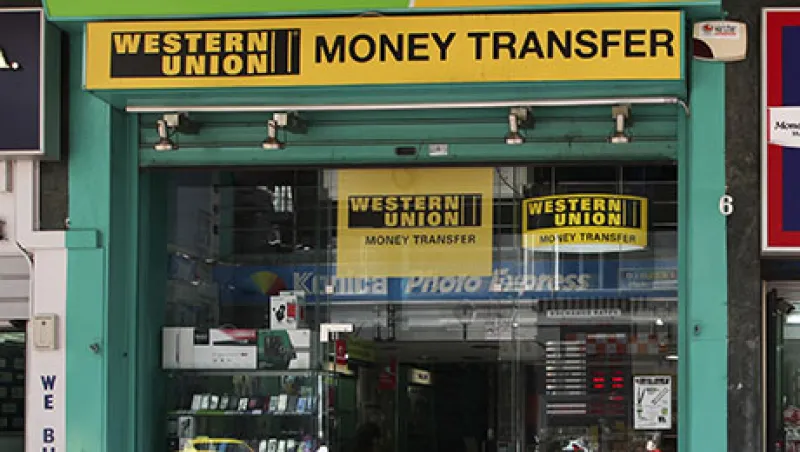This month Western Union partnered with Blue Sky Studios and 20th Century Fox to use characters from their new animated film, Rio 2, in an advertising campaign. For a company whose brand is ubiquitous but whose marketing is minimal and old school, this foray into cross-promotional advertising with Hollywood studios marks a notable departure for Western Union, and it comes at a time when the company could use some positive buzz.
The perennial champion of the money-transfer business, Western Union today finds itself under attack at home and abroad. Walmart dealt it a blow on April 17 when the Bentonville, Arkansas–based retailing behemoth launched a competing service dubbed Walmart-2-Walmart, a system that enables customers to make U.S. domestic money transfers using any of the company’s more than 4,000 stores. Western Union shares fell 5 percent that day. Even harder hit was rival MoneyGram, which currently operates its own outlets within Walmart stores; the Dallas-based company’s stock plunged 18 percent the next day. MoneyGram is still available at Walmart, and unlike the store’s new house brand, it handles international transfers.
The good news for Western Union is that Walmart’s entry should have only a modest impact on its business. The company’s U.S. network of more than 46,000 agents accounts for only 8 percent of its overall revenue, and its domestic transfers are not growing very rapidly.
“Western Union’s growth is more going to be driven by increasing penetration in countries like India and the Philippines, rather than domestically,” says Joshua Strauss, portfolio manager of the Appleseed Fund and co-CEO of its investment advisory firm, Pekin Singer Strauss Asset Management. Appleseed has 3.2 percent of its assets invested in Western Union. “Pricing just got a lot more aggressive in certain corridors for the industry, and Western Union will likely respond to this price aggression in the near term.”
Western Union, which processed 242 million customer-to-customer transactions and 459 million business payments in 2013, has a near monopoly on the foreign money-transfer business. The company has in excess of 500,000 agents, and more than 90 percent of them are located outside the U.S., in more than 200 countries.
American expatriate Christopher Caillavet, a copy editor at English-language newspaper Bangkok Post, has to use Western Union every few months to send money from Thailand to his mother in the U.S. “It’s Western Union or get out, and the fees are outrageous,” Caillavet said in an e-mail.
Yet even in overseas markets, Western Union faces incipient competition from new rivals such as San Francisco–based Xoom and ExpressSend, a remittance program operated by Wells Fargo. Internet-based Xoom allows users to send money from a U.S. bank account, debit card or credit card to recipients in 31 countries. Varying by destination country, the money can be picked up in cash or be deposited into a bank account. ExpressSend allows Wells Fargo’s U.S. customers or ExpressSend subscribers to send money overseas. Depending on the foreign bank processing the transaction, the funds can be picked up in cash or deposited into an account.
At Xoom, for example, customers can send up to $2,999 a day to Vietnam for merely $2.99, drawing on a bank account, or $27 using a credit card. Western Union charges $5 and $45 — 67 percent more — for the equivalent transactions. Wells Fargo’s ExpressSend charges $9 for a transfer from a bank account and $17.50 to send cash.
In some markets, however, Western Union is cheaper. Xoom charges $5 to $76 to send up to $2,999 to Mexico, whereas Western Union charges $4 to $25 for an equivalent transaction. Fees can vary from country to country depending on a number of factors, including the volatility of the local currency, volume and consumer protection costs.
“The barriers to entry are a lot lower in the market for person-to-person remittances and within the same country,” says Jason Kupferberg, managing director and senior analyst in equity research at Jefferies & Co. in New York. “But the levels of compliance around cross-border transactions are a lot more significant, so it can be more challenging for competitors.”
The competition from Walmart comes at an inopportune time: Western Union expects no profit growth in 2014 because higher compliance costs and capital investments in its digital platform will squeeze margins this year. The company pointed to compliance costs as one factor behind a 27 percent drop in net income in the fourth quarter of 2013, to $173.4 million, or 31 cents per share. It plans to hire 2,000 people by early 2015 just to handle compliance issues.
The stock closed at $15.81 on April 24, up 9.26 percent from a year earlier but well below its 52-week high of $19.44 in October.
Analysts at Credit Suisse doubt that Western Union can drive earnings growth above mid–single digits in the long term. “Given the heightened competition, evolved technological landscape, increasing regulatory pressures and continued pricing pressure, we believe Western Union’s business model is under attack,” wrote New York Credit Suisse analyst and vice president of equity research George Mihalos and his colleagues, in a February 11 report. “While we view the company’s cash flow generative prowess as solid, it’s unclear what catalysts remain in order for the business to reaccelerate.”
Analysts criticize the company for failing to adopt new technologies to compete with a growing number of cheaper mobile and online money-transfer services. Plus, moves Western Union is already making on this front stand to cut into operating costs.
“It is critical that they adapt to the electronic channels so they can service both technology-savvy customers and those who are not,” says Kupferberg. “The company has been too reliant on its significant agent network and global brand and perhaps didn’t recognize some of the underlying changes in the industry that have been going on. It needs to play catch-up and act more aggressively.”
Western Union does offer mobile phone transactions but only to a handful of countries via a limited number of carriers. Electronic channels accounted for 5 percent, or $275 million, of its 2013 revenue of $5.54 billion, but such transactions grew by 65 percent last year, suggesting the company is adapting to the changing industry, says Brett Horn, an analyst with Morningstar in Chicago. The company has a strong competitive advantage over online money transfers in that it allows customers to send cash and doesn’t require a bank account.
“With most developing countries still predominantly cash-based, we expect Western Union’s customers to be very late adopters of any new payment methods,” Horn wrote in an April 9 analyst note. “A wide-scale industry switch to alternative methods would require a dramatic improvement in electronic payment infrastructures on a global basis, a change that is likely to take a very long time.”
In its fourth-quarter 2013 earnings report, the company unexpectedly announced a $500 million share buyback program through June 2015. Given the company’s compliance constraints and weakening profitability, Mihalos doubts that Western Union can achieve that goal.
Will the company’s newfangled marketing help? Rio 2, which earned middling reviews from critics, had raked in a somewhat disappointing $81.16 million at the U.S. box office after two weekends, as of April 24, but it performed better internationally, pulling in $199.7 million. Western Union won’t have to wait long for its reviews. The company will release its first-quarter results after the market close on May 1.
Get more on corporations.






